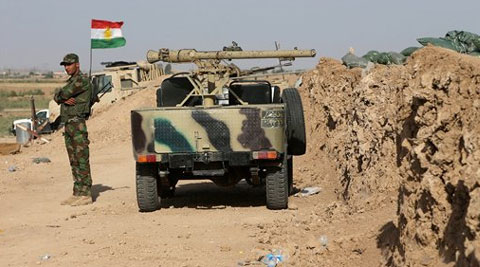 Thiruvananthapuram, Jul 4: All 46 Indian nurses abducted from Tikrit in strife-torn Iraq were released by ISIS militants on Friday. The development came as a rare piece of positive news amid a bloody war raged by the Sunni insurgents.
Thiruvananthapuram, Jul 4: All 46 Indian nurses abducted from Tikrit in strife-torn Iraq were released by ISIS militants on Friday. The development came as a rare piece of positive news amid a bloody war raged by the Sunni insurgents.
The nurses will fly back to Kerala on Saturday morning, IANS quoted chief minister Oommen Chandy as saying.
Chandy told the news agency over telephone from New Delhi that an Air India flight will depart from the Indian capital on Friday evening to Erbil, the capital of Kurdistan region, to evacuate the nurses.
"There will be one official each from the Kerala and central governments on the plane. The nurses will board the flight at Erbil and the plane will reach Kochi at 7am tomorrow (Saturday)."
The nurses, all from Kerala, were on Thursday taken from Tikrit to Mosul by Islamic State of Iraq and the Levant (ISIS) militants. They reached Mosul unharmed on Thursday night, their relatives said. The nurses worked at a hospital in Tikrit, Saddam Hussein's hometown.
A glimmer of hope appeared for their relatives on Friday morning after one of the nurses sent a text message to her family members in Kerala.
"We got an SMS saying they (the nurses) are on their way to Erbil airport, which is 70kms away from Mosul. If everything goes well, they will be back in the country late tonight," a relative told HT. However, Chandy later said the anxious family members will have to wait a bit more.
AFP quoted Tincy Thomas, an abducted nurse, as saying, "Some here ... they are saying ... we will go to Erbil."
An Indian diplomat, speaking on condition of anonymity, told the news agency that the group was expected to reach Erbil, which is a short drive from Mosul but has been insulated from the unrest.
According to the relatives, militants did not misbehave with the hostages, whose ordeal began on June 11.
Early on Friday, Shobha Sasikumar, mother of abducted nurse Shruti, said, "My daughter called me last night saying they reached Mosul around 11pm (Indian time). They are in an old building that is without electricity. So far, the abductors were friendly towards them."
The abduction of the nurses, all of them women and from Kerala, had spelt a fresh trouble for India. A month ago, ISIS militants, who now control northern and western Iraq, snatched 40 Indian construction workers from Mosul. All but one of them are still in captivity. The Centre had said on Thursday that it was trying its best to combat the crisis.
The government sought the help of some prominent Indians settled in Saudi Arabia and other Gulf countries. Some reports also said external affairs minister Sushma Swaraj called up politicians in Gulf countries and sought their help in view of the crisis in Iraq.
The release of the Indian nurses will be a big boost to the Centre's diplomatic efforts. According to sources in the government, the "decision" to make the nurses obey ISIS order to move to Mosul came after Swaraj and Chandy held talks twice on Thursday when nurses were also spoken to.
Search
46 Indian nurses freed, will return from Iraq tomorrow morning: Reports
July 4, 2014





Comments
Add new comment